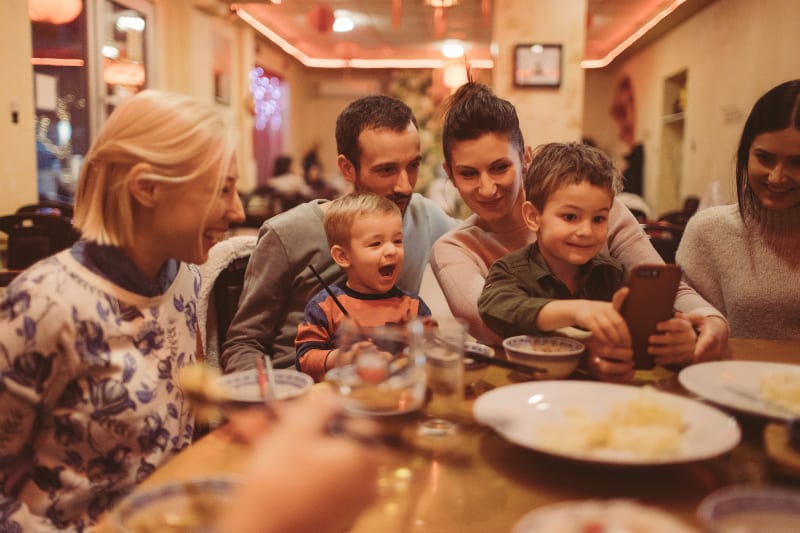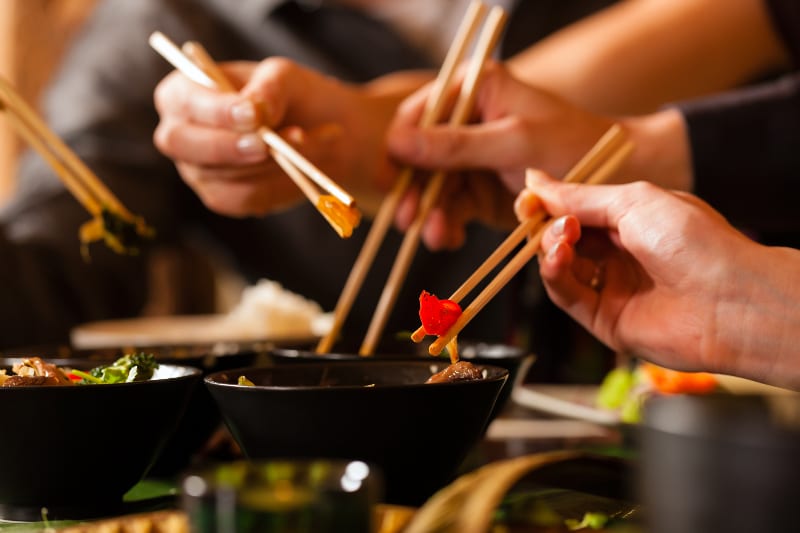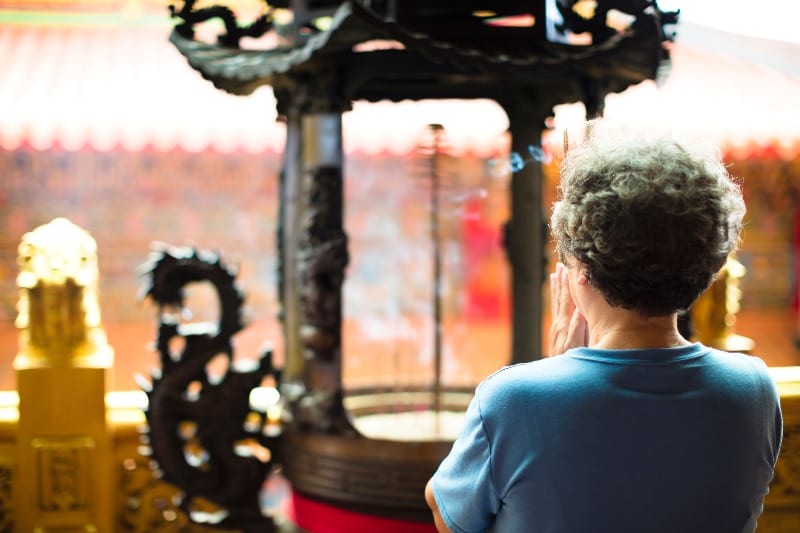This do’s and don’ts in China is back pocket material to keep you out of trouble on your China tour.
From table manners to Chinese temple etiquette, we know you’ll want to avoid any embarrassing moments on your China tour. That’s why our outstanding local guides, working in destinations all across China share these top tips.
Good manners in China
It pays to know that although Chinese people have been greatly influenced by the modern outside world, they remain strongly steeped in tradition and reading the do’s and don’ts in China provided below will help you understand the Chinese traditions and allow you to save face and act like a local!
1. Table manners in China

To dine in China is not just to eat but to experience and share in good company. Different from western society, Chinese people practice a ‘gather dining system’. That means dishes are placed communally in the center of the dining table and everyone is encouraged to help themselves.
While the emphasis is on eating well, there are still a few do’s and don’ts to remember.
Chinese table manners – do’s
Allow for elders to be seated first. Following this, you will be instructed where to sit. when dining with elders, it is also impolite to begin eating before they do.
It is suggested to engage in each toast, saying the phrase ‘gan bei’ before finishing your drink – pronounced ‘gun bay’ – which means ‘dry cup’.
Try everything. At dinner, it is both polite and encouraged to sample every dish available and remarking aloud with ‘eating noises’ that you enjoy the food. “Mmm, Delicious!”
Feel free to drink from the bowl, as will everyone else, or using your fingers to eat things like shrimp or chicken. Just make sure that you’re not touching food that isn’t already on your own plate.
Chopsticks are the most versatile tool you’ll find on Chinese dining tables. Even if you’re not an expert. Give them a go. Your Chinese host will love it!
Chinese table manners – don’ts

Never leave chopsticks upright in your food, like incense sticks! This symbolizes death because it is similar to the ceremony that Chinese people use to pray for someone who has passed and is considered bad luck.
Avoid tapping the bowl with your chopsticks and never point them at other people when dining. This is considered to be extremely rude and best to be avoided entirely.
Do NOT use your own chopsticks to put food on your plate – this will have everybody else turning up their nose! Use the serving chopsticks or ladles provided to show proper table manners.
While tipping is not a common practice in Chinese restaurants, in Chinese culture, asking someone to dinner means you just offered to pay for the bill.
2. Gift giving and receiving gifts in China

In Chinese society, it is often the case, that people are likely to decline the offer a few times before accepting a gift, as a way of showing modesty.
When gifting in China, you’ll definitely want to avoid the following things that may cause insult and misunderstanding.
Gift giving and receiving gifts in China – do’s
Offer your gift with both hands. This is considered respectful in China, and in exchange, gifts should be received with both hands.
It is customary in Chinese culture to refuse to accept a gift once or twice before accepting it. Respectfully declining, to show one is modest before accepting the gift, is commonplace in Chinese culture and this may be done several times. So don’t be discouraged when giving gifts, but don’t be too eager upon receiving one either!
Gifting fresh produce such as fruit or other treats is very polite in Chinese culture, especially if presented neatly with a box or basket.
When giving gifts from your home country, Chinese people usually appreciate gifts along the lines of souvenirs, cigarettes, and alcohol, in lieu of this a reputable Chinese brand is also a satisfactory gift.
Gift giving and receiving gifts in China – don’ts
Avoid giving a clock as a gift. To say “sending a clock” in Chinese is the same as saying “attending a funeral”. Therefore, sending a clock to someone as a gift in China is usually regarded as cursing someone to die. This is obviously extremely impolite to give as a gift to anyone. Similarly, scissors and other sharp objects do not make proper gifts either, as they represent the severing of relationships.
Never gift white or yellow flowers, particularly chrysanthemums. These are funeral flowers in China. Do not offer them as gifts to anyone, especially to elderly people, patients, or someone who is sick.
Don’t send pears or umbrellas to your Chinese friends in a relationship! Especially newly married couples, because the Chinese pronunciation of “pear” is exactly the same as “divorce”. In the same way, saying “umbrella” in Chinese implies “separation”. Sending these gifts to Chinese couples is strongly regarded as cursing them to be apart.
When wrapping your gift, to be on the safe side, use red wrapping paper. While other festive colors can be used, they seldom are. Never wrap in any dark color, black, dark blues, and purples, etc. Stick with red, and you can’t go wrong!
Chinese people usually think it is impolite to open the gift in front of the sender. So do not feel frustrated if they decide not to open the gift in front of you. So when you receive a gift, avoid hastily unwrapping it. Unless indicated by the person presenting you with the gift, It is advised to open the gifts after you leave.
3. Important cultural do’s and don’ts in China
Chinese cultural etiquette – do’s
Punctuality is an important virtue in China, as it shows respect for others, so always be on time. Arrive slightly before important engagements or events, as being a little earlier than the appointed time shows your character and respect of others time.
Be aware, the number four is highly regarded as ‘the unluckiest number’ in Chinese culture, as it has the same pronunciation as “death” in Chinese. So don’t be shocked to find the fourth or fourteenth floor of a building has been changed or altered when traveling around China.
Chinese cultural etiquette – don’ts
Don’t be taken aback when asked personal questions regarding age, relationships, family, what you do for work, or even income. This is considered Chinese-style small talk and is perfectly polite within Chinese society.
Avoid being too physical when meeting Chinese people for the first time. They will find this very uncomfortable from a stranger. A handshake and a smile or simple nod of the head are more than enough to demonstrate your friendliness.
Similarly, avoid public displays of affection. China is a very reserved society and generally looks down upon these. Remain mindful of this and your China tour will be an unforgettable one.
4. Exploring China’s Tibetan Temples or Monasteries? Some valuable do’s and don’ts

Cultural etiquette in Tibet – do’s
- Take off your hat as a sign of respect when entering temples.
- Always walk clockwise when inside a monastery or temple.
- Be sure to donate a couple of yuan to religious beggars. This is considered an act of good karma in Tibetan culture.
Cultural etiquette in Tibet – don’ts
- Don’t photograph people. Tibetans do not appreciate being photographed. However, if you ask permission first, this is usually acceptable.
- Don’t touch a Tibetan on the head. Tibetans believe God resides in your head and may be offended if you touch them here.
- Don’t step on a lama’s shadow or walk between a person praying to the Buddha and the statue.
- Don’t point directly. If you want to indicate a statue and have to use your hand you should gesture palm up, fingers flat and together, in that direction.
Experience authentic Chinese culture with ChinaTours.com
With local guides to guide you around, learn your Do’s and Don’ts in China and never worry about making a cultural faux pas.
Ready to experience more of the real China? Possibly join us on a Tibet tour now that you know the cultural etiquette? Why not check out our China Tour Packages, or have a look at our Best China Tours page.
Feeling the travel bug and think a China tour might fix it? There’s no better place to start than by connecting with a China travel agency who can provide you with an experience of the real China. Traveling to 20 unique and exciting destinations, including Beijing, Xi’an, and Shanghai, ChinaTours.com, combined with the option of small group, private and custom tours, we’ve designed our China tours to meet the needs of people who enjoy structure and flexibility when they travel. Ready for adventure? Enquire now.


